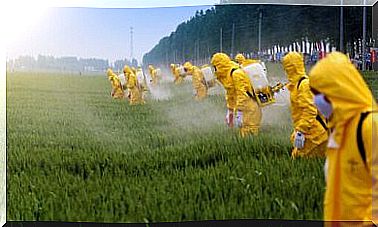Hyperosmia: Definition And Causes

Can you imagine what it would be like to smell sweat or manure much more intensely? A real ordeal, isn’t it? This is what happens daily with people who suffer from hyperosmia.
It is a disorder that is characterized by an exaggerated ability to smell smells that other people do not even notice.
These people can, for example, smell a lily or jasmine among a pile of rubbish, or recognize the scent of a person who is far away. But this does not mean that they change into hunting dogs or that they have superhuman abilities, but rather that they have developed a hypersensitivity and unique olfactory ability.
Hyperosmia: quality or disorder
This olfactory skill has both advantages and unpleasant consequences for those who enjoy it and suffer it. For some, in general terms, it is considered a blessing, while for others it ends up being a great suffering.

Let’s look at some examples:
If we are at the door of the house and we smell an appetizing smell of food or cake that is being prepared by one of our neighbors, the most normal thing is that we are left with a ravenous appetite. “How hungry! Our! I want to eat this!”
On the one hand, if we have food at home or the neighbor is our friend, it’s an advantage. But on the other hand, if the item that causes the smell in such an intense and continuous way is not so appetizing or we cannot satisfy the awakened craving (hunger), things change.
At this moment, standing at the door of the house, calmly relaxed after a long day at work, all kinds of aromas reach us without us being able to do anything to avoid them: the grease you use on your shoes (and which is upstairs ), a bathroom freshener, the downstairs dog, or oil from a burnt pot.
And that happens daily, anytime. The only thing we would feel like doing is living with a preacher holding his nose.
When does hyperosmia appear?
This pathology is in the same dimension, albeit at the other extreme, of two other types of perceptual disorders related to smell: hyposmia, decreased olfactory sensitivity to smell, and anosmia, the total absence of the ability to smell.
Of the three, hyperosmia is the rarest, making it a poorly researched disease. It is precisely its low incidence in the population that has not allowed the causes that produce it to be known with greater certainty.
For example, it is known that there are certain diagnoses or risk factors that it is associated with, such as menopause, Addison’s disease, hyperthyroidism, or neuronal changes from amphetamine use or withdrawal syndrome.
In some cases, this condition ends up disappearing on its own : it only appears for a certain period of time. Only in extreme cases does it last for a lifetime.
Does she play for or against?
For a perfumer or sommelier, having hyperosmia is a real advantage. This is the case of the protagonist of the novel and film of the same name, ‘Perfume: a Assassin’s Story’, for whom his hyper olfactory perception allowed him to be one of the best in his profession. However, for the rest of the people, it can turn into a real agony.

This disorder causes very serious problems in social contexts, due to the degree of rejection and unpleasantness that certain smells cause. For example, coming to regard your favorite food as something disgusting or your favorite perfume as something unbearable.
The person can also faint if they are in very crowded spaces or with large crowds of people, such as on a bus or subway.
How does hyperosmia disappear?
Since its origin cannot be safely determined, treatments or ways to improve hyperosmia also offer contradictory results.
For example, some dopamine antagonist antipsychotic substances have been used to treat this disorder. By inhibiting these neurotransmitters, the amount of smells that reach the olfactory bulb is limited.
From testimonies from people who suffer from it, we know that smoking also diminishes your olfactory ability. But be careful! This claim needs to be handled with great caution, because if there is one thing that already has enough scientific evidence, it is that smoking does not improve anyone’s health. Quite the opposite.
Therefore, without a doubt, the first thing to be done, both for people who suffer from this disorder and for those around them, is to avoid or remove strong odors, which can become truly unbearable. These can be foods like fish, meat, some sauces or even coffee. The lack of a pharmacological treatment offers no other option than non-exposure.
Hyperosmia in pregnant women
Interestingly, many women who suffer from this type of “passenger” disorder are pregnant. Therefore, during the beginning and the end of pregnancy, they have an olfactory hypersensitivity mainly due to the increase in the concentration of estrogen and progesterone in their blood.
This makes the woman have a sharper sense of smell, that she may feel rejection to certain smells that were pleasant to her before, or the other way around; and it can make you vomit more often when you notice smells that are truly repulsive.

In some pregnant women, this change decreases or disappears after the first trimester. In others, it remains throughout the gestation period and disappears more gradually after delivery.
It is possible that this physiological change was inherited from our ancestors, so that the mother could recognize the smell of her own baby at birth.
Other Curious Smell-Related Perception Disorders
Dysosmia is a neurological disorder that causes an alteration in the sense of smell. It can manifest itself in anosmia (as we talked about above), parosmia or phantosmia.
- Parosmia refers to a deterioration of the olfactory function, which leads to the brain’s inability to correctly identify the natural or intrinsic smell of something particular. For example, one person finds the smell of a rose unpleasant, whereas it is usually a pleasant smell for the rest of people.
- Phantoms are a kind of olfactory hallucination in which people detect smells that don’t exist or aren’t close to them. This phantom smell makes people think they smell gas, believe there is a leak, and therefore they are at risk. We speak of a very potent suggestion of smell.
The smell of frying, no matter how caloric it is, does not satisfy the appetite. Further scientific research is needed on this type of disorder and, in particular, on hyperosmia. In order to reduce its impact on the lives of people who suffer from it, it is essential to determine why and how it appears.









